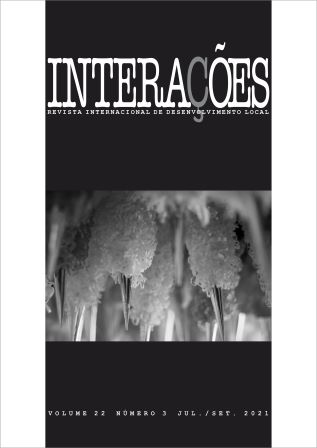Redes no contexto da cultura digital: tecnologias, coordenadores, professores e alunos universitários
Palavras-chave:
cultura digital, tecnologias, processo educativo formativo, abordagem da etnografia virtualResumo
Esta pesquisa tem o objetivo de analisar redes de relações no contexto da cultura digital, com enfoque nas ligações entre tecnologias, coordenadores, professores universitários e alunos. Trata-se de uma pesquisa qualitativa, com abordagem de etnografia virtual, desenvolvida em uma universidade privada do Centro-Oeste do Brasil, com a participação de 39 professores universitários, 285 alunos e 7 coordenadores, respondendo a questionários e entrevistas semiestruturadas e postando mensagens no Facebook, relacionadas à cultura digital e ao processo educacional formativo. Os resultados apontam para um contexto de descompasso entre as idas e vindas de professores universitários, alunos e coordenadores, buscando se apropriar das tecnologias de forma a inventar outras formas de ensinar e aprender, em diferentes tempos e espaços, individual e colaborativamente, com abertura para a inovação de forma crítica.
Referências
BANNELL, R. I.; DUARTE, R.; CARVALHO, C.; PISCHETOLA, M.; MARAFON, G.; CAMPOS, G. H. B. Educação no século XXI: cognição, tecnologias e aprendizagens. Petrópolis: Vozes; Rio de Janeiro: PUC, 2016.
BARRETO, R.G. (Org.). Tecnologias educacionais e educação a distância: avaliando políticas e práticas. Rio de Janeiro: Quartet, 2001.
CAZELOTO, E. Apontamentos sobre a noção de “democratização da internet”. In: TRIVINHO, E.; CAZELOTO, E. A cibercultura e seu espelho: campo de conhecimento emergente e nova vivência humana na era da imersão interativa. São Paulo: ABCiber; Instituto Itaú Cultural, 2009.
FLORIDI, L. (Ed.). The onlife manifesto: being human in a hyperconnected era. London: SpringerOpen, 2015. 255 p. Disponível em: https://link.springer.com/content/pdf/10.1007%2F978-3-319-04093-6.pdf. Acesso em: 10 fev. 2020.
FREIRE, P. Política e educação. São Paulo: Cortez, 1993.
GUAZZELLI, D. C. H. R. Inovações pedagógicas com o uso de tecnologias. In: GOMEZ, M. V. Círculo de Cultura Paulo Freire: arte, mídia e educação. São Paulo: Fundação Memorial da América Latina, 2015.
HERNÁNDEZ, F.; SANCHO, J. M.; CARBONELL, J.; TORT, A.; SIMÓ, N.; SÁNCHEZ-CORTÉS, E. Aprendendo com as inovações na escola. Porto Alegre: Artmed, 2000.
HINE, C. Virtual ethnography. London: SAGE Publications, 2000.
HINE, C. Por uma etnografia para a internet: transformações e novos desafios. [Entrevista concedida a] Christine Hine. MATRIZes, São Paulo, v. 9, n. 2, p. 167-73, jul./dez. 2015.
IMBERNÓN, F. Formação docente e profissional: formar-se para a mudança e a incerteza. São Paulo: Cortez, 2004.
KENSKI, V. Tecnologias e Ensino presencial e a distância. Campinas: Papirus, 2003.
LEMOS, A. A cibercultura como território recombinante. In: TRIVINHO, E.; CAZELOTO, E. A cibercultura e seu espelho: campo de conhecimento emergente e nova vivência humana na era da imersão interativa. São Paulo: ABCiber; Instituto Itaú Cultural, 2009.
LESSIG, L. Remix: making art and commerce thrive in the hybrid economy. New York: The Penguin Press, 2008.
LÉVY, P. Cibercultura. 3 ed. São Paulo: Editora 34, 2010.
MARTÍN-BARBERO, J. Dos meios às mediações. Rio de Janeiro: UFRJ, 2003.
MINAYO, M. C. S. Pesquisa social: teoria, método e criatividade. 32. ed. Petrópolis: Vozes, 2012.
MOREIRA, J. A.; SCHLEMMER, E. Por um novo conceito e paradigma de educação digital onlife. Revista UFG, Goiânia, v.20, n. 26, p. 63438, 2020.
PRETTO, N.; SILVEIRA, S. A. Além das redes de colaboração: internet, diversidade cultural e tecnologias do poder. Salvador: EDUFBA, 2008.
SANTOS, E. A cibercultura e a educação em tempos de mobilidade e redes sociais: conversando com os cotidianos. In: FONTOURA, H. A; SILVA, M. (Org.). Práticas pedagógicas, linguagem e mídias: desafios à pós-graduação em Educação em suas múltiplas dimensões. Rio de Janeiro: ANPEd Nacional, 2011.
SANTOS, E. Pesquisa-formação na cibercultura. Santo Tirso: Whitebooks, 2014.
SILVA, R. N. K. O perfil necessário ao professor frente à influência da cibercultura no contexto educacional. ReDoC- Revista Docência e Cibercultura, Rio de Janeiro, v. 4, n. 2, p. 103-18, 2020.
Downloads
Publicado
Como Citar
Edição
Seção
Licença
Direitos Autorais para artigos publicados nesta revista são do autor, com direitos de primeira publicação para a revista. Em virtude de aparecerem nesta revista de acesso público, os artigos são de uso gratuito, com atribuições próprias, em aplicações educacionais e não-comerciais.


